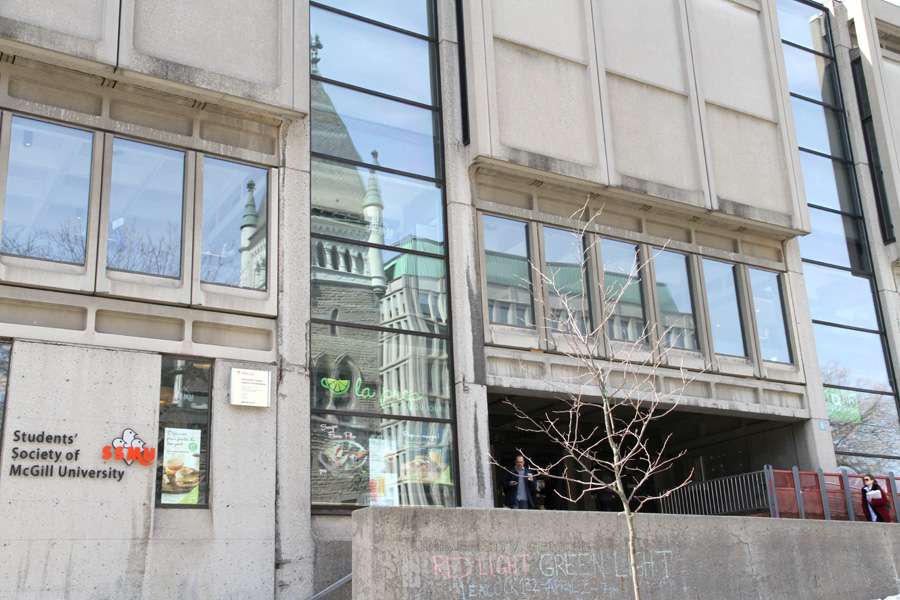Full-time undergraduate students will be facing an additional $5.78 fee per semester, following the 69 per cent approval of the University Centre Building Fee questions during the first Fall 2014 referendum period. The fee was proposed in order to finance the negotiated lease agreement between the Students’ Society of McGill University (SSMU) and McGill. The fee will also increase at a rate indexed to inflation each year, as stipulated by the second question of the referendum, which was approved by 55.2 per cent of voters.
Had the fee not passed, SSMU executives said that the SSMU would have faced shortened building hours and raised prices at various businesses and services that SSMU provides, such as Gerts and minicourses.
“We’re extremely excited to move on with the year and start planning things and bring back a lot of things we campaigned on—[for example,] student research positions, bringing our budgets back to where they once were […] and also not worrying about finding ways to pay for rent and utilities that would also cut services,” said SSMU President Courtney Ayukawa.
Although students are able to “opt out” of certain fees, the University Centre Building Fee will not be one of them. The current lease agreement is set to end in 2021 and will also mark the expiration of the building fee.
This was the second time SSMU has run the building fee levy questions. Originally presented during the Winter 2014 referendum period, the University Centre Building Fee proposal was opposed by 53.6 per cent of the voting student body. Similarly, students also voted against the proposed yearly fee increase of 5.6 per cent.
Aiming to inform the McGill student body on the repercussions of the building fee referendum not passing the second time around, SSMU formed a “Yes” committee and gave out information through its website and Facebook pages.
Ayukawa explained that accessibility was an important part of SSMU’s campaign.
“Campaigning was a really great way to get feedback from people, and was also a really nice way to hear how students on campus in different years are feeling about SSMU and the things that SSMU does,” she said.
There was a 21.8 per cent voter turnout for the Fall 2014 referendum,with a total of 4,890 students, as compared to 18.3 per cent in the Fall 2013 referendum period.
“It’s hard to say whether or not this increase in turnout is statistically significant,” SSMU Chief Electoral Officer Ben Fung said. “However, we can presume that increased turnout could be explained by increased coverage by campus publications, increased campaigning efforts by committees, or simply the importance or relevance of the referendum question to the electorate.”
The rerunning of the building fee questions has been a point of contention on campus, with some students claiming that students should not be held accountable for the payment of a lease that SSMU should be responsible for.
Nadia Kadri, second-year law student, said that although having a “Yes” vote on the second referendum is important for SSMU’s operations, a student fee should not have been necessary in the first place.
“I don’t think that student fees should be compensating SSMU for being unable to cover more of its costs from its revenue-generating endeavours, like Gerts and The Nest,” Kadri said. “I think that imposing such a high fee and indexing it for inflation reduces SSMU’s incentive […] because now they will rely on our money to pay the bills.”
Former Council member Élie Lubendo, U2 Management (Labour Relations), also criticized the lack of transparency of the SSMU lease negotiations.
“I give credit to the SSMU for preparing a successful “Yes” Campaign in response to the backlash that the last referenda question received [….] but as representatives of the SSMU, I believe that a more detailed account should have been presented,” he said. “Moving forward, the passing of the fee is a temporary victory. Plans should be discussed as to how we want to re-negotiate the lease in the future and what steps we are willing to take to achieve such a goal.”
In response to the criticisms of the SSMU lease negotiations, Ayukawa stated that SSMU will try to ensure the transparency of future negotiations, such as SSMU’s upcoming negotiation of its memorandum of agreement (MOA) with McGill, which will end in May 2016.
“Since the fee passing, we’ve had a bunch of conversations about […] things that people were pleased about, things that people were less pleased about, and how to move forward with that in mind,” she said. “The lack of transparency with regards to negotiating the lease was a frustration that a lot of people had [….] VP University Affairs Claire Stewart-Kanigan and I have already met with Ollivier Dyens, Deputy Provost [Student Life and Learning]. In our first meeting with them, we told them that our first priority was for the [MOA] meetings to be completely transparent, except for things that are confidential by law.”
According to Ayukawa, the revised budget that incorporates the funds garnered through this fee will be presented to SSMU Council on Oct. 23. Pending the budget’s approval, certain programs offered by SSMU will be restored.
“I know that [the] UA is hoping to bring in a couple of student research positions,” she said. “Until that budget is approved in Council, we can’t start planning any jobs or job descriptions.”
The SSMU building will resume regular hours of 7 a.m. to 1 a.m. on weekdays, 9 a.m. to 1 a.m. on Saturdays, and 9 a.m. to 5 p.m. on Sundays as of Oct. 18. Students should see the building fee charged on their student accounts by Oct. 3.








